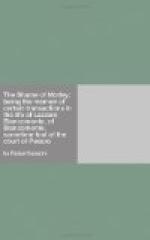In front of me he halted, and setting his hands on his hips he regarded me with a brutal mirth.
“What may your trade be now?” he asked at last contemptuously.
I had taken rapid stock of him in the seconds that were sped, and from the surpassing richness of his apparel, his gold-broidered doublet and crimson, fur-edged surcoat, I knew that Messer Ramiro del’ Orca was grown to the high estate of Governor of Cesena.
“A new trade even as yours,” I answered him.
“Nay, that is no answer,” he cried, overlooking my offensiveness. “Do you still follow the trade of arms?”
“I think,” Filippo interposed, “that our Excellency is in some error. This gentleman is Lazzaro Biancomonte, a poet of whom Italy will one day be proud, despite the fact that for a time he acted as the Lord Giovanni Sforza’s Fool.”
Ramiro looked at his interlocutor, as the mastiff may look at the lap dog. He grunted, and blew out his cheeks.
“There is yet another part he played,” said he, “as I have good cause to remember—for he is the only man that can boast of having unhorsed Ramiro del’ Orca. He was for a brief season the Lord Giovanni Sforza himself.”
“How?” asked the profoundly amazed Filippo, whilst all present pressed closer to miss nothing of the disclosure that seemed to impend. Myself, I groaned. There was naught that I could say to stem the tide of revelation that was coming.
“Do you then keep this paladin here arrayed like a clerk?” quoth Ramiro in his sardonic way. “And can it be that the secret of his feat of arms has been guarded so well that you are still in ignorance of it?”
Filippo’s wits worked swiftly, and swiftly they pieced together the hints that Ramiro had let fall.
“You will tell us,” said he, “that the fight in the streets of Pesaro, in which your Excellency’s party suffered defeat, was led by Biancomonte in the armour of Giovanni Sforza?”
Ramiro looked at him with that displeasure with which the jester visits the man who by anticipation robs his story of its points.
“It was known to you?” growled he.
“Not so. I have but learnt it from you. But it nowise astonishes me.”
And he looked at his sister, whose eyes devoured me, as if they would read in my soul whether this thing were indeed true. Under her eyes I dropped my glance like a man ashamed at hearing a disgraceful act of his paraded.
“Had it indeed been the Lord Giovanni, he had been dead that day,” laughed Ramiro grimly. “Indeed it was nothing but my astonishment at sight of the face I was about to stab, after having broken the fastenings of his visor that stayed my hand for long enough to give him the advantage. But I bear you no grudge for that,” he ended, turning on me with a ferocious smile, “nor yet for that other trick by which—as Boccadoro the Fool—you bested me. I am not a sweet man when thwarted, yet I can admire wit and respect courage. But see to it,” he ended, with a sudden and most unreasonable ferocity, his visage empurpling if possible still more, “see to it that you pit neither that courage nor that wit against me again. I have heard the story of how you came to be Fool of the Court of Pesaro. Cesena is a dull place, and we might enliven it by the presence of a jester of such nimble wits as yours.”




